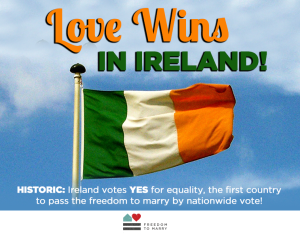 This week has seen a game changing referendum in Ireland where, for the first time anywhere, the question of marriage equality was put to the popular vote. I could not be more proud of the Irish people for their resounding “yes” to allowing same-sex partners to have true equality with heterosexual couples when it comes to marrying.
This week has seen a game changing referendum in Ireland where, for the first time anywhere, the question of marriage equality was put to the popular vote. I could not be more proud of the Irish people for their resounding “yes” to allowing same-sex partners to have true equality with heterosexual couples when it comes to marrying.
Personally, I dislike the term ‘gay marriage’ because it suggests something for gay people. Actually, it is about equality with everyone else. It’s a subtle difference, but an important one. I do absolutely believe that gay people should have the right to marry, to live as a committed couple and to raise children if they so choose.
I believe also that we should have exactly the same rights and the same range of options to choose from as everyone else. As human beings however, it is the choices we make and the way we adapt them to fit, which defines us. I would be infinitely saddened if I thought that all we had achieved was the option to simply live in an imitation of a traditional heterosexual marriage. I’m not knocking traditional marriage. It certainly has its place in society both for gay and straight couples. It should always be one of the options available.
However, (you knew that was coming didn’t you?), I firmly believe also, that homosexual couples have much to teach some of their heterosexual peers about maintaining healthy long-term relationships. Of course we are surrounded always by heterosexual couples who have maintained happy, long term marriages which work. My sisters and I are all in long term committed marriages and none of us have any experience of divorce. I put that, in part, down to the example given by our parents who are about to mark their sixtieth year together.
When I look at my own relationship of thirty-three years, I have to admit, that the option to marry simply comes as an affirmation of what we already have together. Maintaining a long-term, same-sex relationship is a very different business to a heterosexual one. In a world of rapid social change we may have things to teach others about the dynamics within a modern marriage.
Long before reaching the point of marriage, most gay men and women have been through an early life which very much dictates their approach to relationships. Whether or not we have had an easy time of coming out, there will be some period of reckoning with our own sexuality. Even if we are happy with that, most of us live in a world which still forces us to go through the constant pressure of controlling other people’s perceptions of us. Whether at home, at school, or in the work place we are constantly weighing up the cost of either hiding or revealing a core part of ourselves.
Hopefully the end result of this struggle is a stronger more resilient person, but then comes the next step. For most people, the desire to find a shared love is an irresistible force. This search has to overcome both internal and external obstacles and it often drives us to create or to find supportive communities. This tends to make gay people the strongly social animals that many people see them as.
Once a gay person does find a true mate, there then comes the whole challenge of building a partnership. The coupling can have many of the same difficulties and pitfalls facing straight couples. Some other challenges however are unique to gay people and are not so surprising when you examine them. Most difficulties come down to how we handle the accepted norms and social legacy of single gender pairings. Ladies, it does not take much reflection to come up with an idea of standard male behaviour including strong attitudes and a desire to dominate. Now double that and imagine two such men trying to establish roles in an all-male household.
How about the emotional openness which is part of the attraction of a woman? Try doubling that and ponder on the consequences. Of course it is precisely these challenges and the strategies we develop for managing them, that can make same-sex couples so strong and resilient.
As gender roles in society become more fluid it is possibly traditional marriage which needs to accept change. I believe that same sex couples have a head start with these challenges and as such we have a lot to bring to the table. Of course it would be foolish to deny that same sex couples can’t learn from our straight friends too.
Marriage in its current, widely accepted form, needs to move with the times. Traditional marriage needs to reach a new level of maturity and could do worse than to look at the existing norms for many long-term same-sex couples. I have mentioned the fluidity of roles, but there are other areas which the gay community seems to have developed different behaviours too. These may include less anger in times of conflict, more freedom in money matters, or the recognition that there are other attractive people out there to admire and comment on. There is even a different approach to things like sexual experimentation and so called infidelity.
It will take several generations for heterosexual relationships to reach the place where gay and lesbian partnerships are today, but it will happen. There may be set backs and detours along the way and I don’t expect it to be a smooth ride.
 We must continue the fight for equal rights throughout the world and we should all cherish our meaningful relationships whether they are conventional, traditional or otherwise. Let’s expand our list of options and move forwards as loving and caring human beings without the fetters of out-dated convention. There is no doubt that at the end of the day, “The greatest thing you’ll ever learn is just to love and be loved in return.”
We must continue the fight for equal rights throughout the world and we should all cherish our meaningful relationships whether they are conventional, traditional or otherwise. Let’s expand our list of options and move forwards as loving and caring human beings without the fetters of out-dated convention. There is no doubt that at the end of the day, “The greatest thing you’ll ever learn is just to love and be loved in return.”
T.J.Masters is a writer based in Hertfordshire, England. Details of his works can be found on his Author website at www.tjmasters.com

Great post and in general, I agree with every single word. But (and you knew that was coming, didn’t you) I have to add that no two heterosexual marriages/relationships are the same just as (I’m sure) not two same sex relationships are. The beauty in relationships is that those involved can sculpt them to fit their combined hopes, expectations and needs. And if anybody takes a honest look at their own relationship I think they’d have to admit this is true for them too.
As far as the Irish referendum is concerned, while I’m delighted we have marriage equality now, what touched me most were the numerous people (in fact, almost all of them) interviewed who said that for the first time ever they actually believed they were equal and accepted because a (vast) majority of the population had used their ‘yes vote’ to say ‘of course you are the same’.
I also was thrilled to hear about Ireland, but I sure wish the U.S. Would do the same thing. This state by state thing is a big pain in the ass. I would think there is more the same than different in both types of relationships. I think any long term marriage/relationship is made up of what works for each couple. What may work for my husband and I, won’t necessarily work for another couple, heterosexual or homosexual. I think ANY long term marriage/relationship has a lot they can teach to other couples.
I was also thrilled to hear about Ireland. But living in Australia, I just want to bang my head against a wall. If Ireland can say yes to marriage equality — surely Australia can? At least in the US there is change, even if it is state by state. Here in Australia — nothing.
End of rant and thank you for the interesting article.
[…] Blog post first appeared in shorter form on the Lovebytes Reviews site in my monthly guest blogger […]